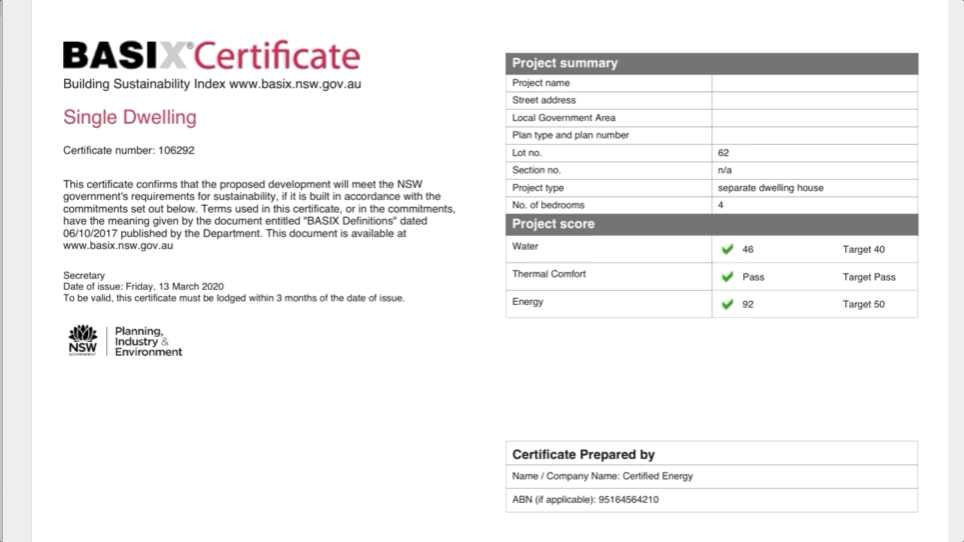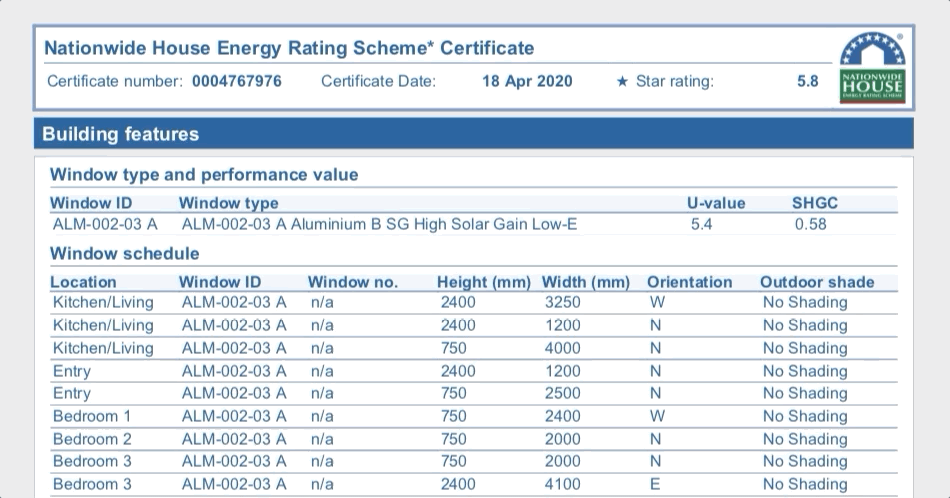4 min read
How the DA process works in NSW | From Pre-DA to Finish
Prior to commencing most types of developments in NSW, you will have to lodge a Development Application (DA) with your...

Understanding the energy efficiency rating of your property is important for several reasons.
First, consider that you or your tenants may currently overpay for electricity due to an inefficient system setup. Improving your rating could, therefore, yield a reduction in annual costs, which could, in turn, drive up your bottom line.

Second, if you’re planning to create a new structure or add on to an existing property, you will more than likely face requirements for demonstrating that the property has completed an energy efficiency assessment.
Whether it is still under construction or already complete, demonstrating its energy efficiency is often a serious draw for interested buyers.
Many more people take the threats of climate change seriously and understand that everyone has a part to play in reducing harmful effects on the environment. Careful stewardship of energy usage is a core part of that responsibility.
Therefore, demonstrating to prospective buyers that your property meets or exceeds the standards in place is an important strategy to consider.
At Certified Energy, we have a team of professionals ready to liaise with your business to provide a comprehensive efficiency assessment.

Partnering with Certified Energy means accessing services beyond basic reports and assessments. Acquiring the necessary certificates required by law or your operation’s circumstances is important, but so too is finding a pathway for improved efficiency.
Why settle for the minimum when you could do more and potentially save money?
We work closely with our clients, acting as a team member with an investment in a positive outcome.
This is the reasoning that underpins much of what we do, from responding rapidly to quote requests to laying out an assessment proposal based on a fixed fee.
Some states, such as NSW, place additional efficiency assessment requirements upon builders and owners. Obtaining your BASIX certificate is straightforward with a thorough approach to the issue.
However, you may also wish to seek an EER for a NABERS classification, a Green Star badge, or certifications in similar programs. Our extensively qualified team works across all these areas.
Whether seeking an energy efficiency report required by law, such as the NatHERS rating, or you wish to seek a voluntary assessment for the Green Star program prior to a sale, the technical challenges involved are immense.
Choosing an assessor that understands these challenges will allow you to access accurate results and find long-term solutions that work.
Let’s work together today to create a healthier, more sustainable future for Australia.
Partner today with your local professionals in sustainability practices and obtain the EER you need in a timely manner.
"With 17+ Years of experience in ESD Consulting, you will be well served by our qualified and personally selected in house specialist BASIX Certifiers. Please reach out, we would love to work with you on your next important project."
Director, Certified Energy




Helping you make smart ESD decisions for your project - saving you time and money on the following types of projects:
.png)
Strap a rocket to your ESD Consultant's back
with this must have BASIX Checklist.

Green, red, and once even bright pink, we have worked on projects from all walks of life in every State and Territory around Australia. Certified Energy has a portfolio of over 5000 BASIX projects, with each a bit of energy saved and a positive environmental outcome for us all.

Everything you need to know about obtaining a BASIX Certificate for your project is now compiled in our BASIX Bible resource.
Volume I:
|
Volume II:
|
To assess the BASIX certificate, you can use the online Assessment Tool which will determine the sustainability of your development application. The assessment tool analyses data of the proposed dwelling’s design against the NSW Government’s water and energy targets. A BASIX certificate is issued upon meeting the BASIX target requirements and paying a fee.
To see our pricing guideline, click here
The development application stage of every new residential dwelling built in NSW of $50,000 or more require a BASIX certificate. Residential dwellings include:
Additionally, alterations and add-ons to existing dwellings which cost greater than $50,000 also require a BASIX certificate.
BASIX Benchmarks:
To determine water and energy targets, the average benchmark for per person consumption of potable water and greenhouse gas emissions within the NSW residential sector is calculated.

BASIX Targets:
The performance targets set by the NSW Government include:
The BASIX certificate benchmarks of water and energy are both measured on a per capita basis, including:
BASIX (The Building Sustainability Index) was introduced as part of the NSW Government’s 2004 initiative to ‘encourage sustainable residential development’ and is in effect part of the Environmental Planning and Assessment Act. The BASIX certificate aims to accommodate NSW with more resilient dwellings together with reducing greenhouse gases and water consumption.
BASIX was established to meet targets of up to 40% reductions in water consumption as well as greenhouse gas reductions by up to 25%. As a result, this delivers financial savings for the home owner.
A BASIX certificate assessment is required for the development application process in NSW and considers various criteria, such as:
Additionally, it also considers thermal comfort levels which lessens the amount of energy used by dwellings in order to heat or cool the house to a comfortable level.
As well as contributing to a sustainable future of urban planning, you as the homeowner will also financially benefit through reduced water and energy bills. Your BASIX certificate will confirm that your proposed project will abide by the NSW Government’s sustainability targets since obtaining a BASIX certificate means your residential building will have passed the government’s environmental targets.
There are various circumstances where BASIX fails to meet the thermal modelling capabilities of NatHERS. BASIX specifies each component of a house individually, whereas NatHERS does not. This makes using BASIX alone difficult as the ‘rapid method’ of assessment jumps to solutions such as expensive windows or shading devices, impacting costs and aesthetics. For example, BASIX may specify higher performance glazing such as double glazing, however, NatHERS has the ability to compensate elsewhere, for example increasing the insulation to avoid the expense of high performing windows. This makes the use of both BASIX and NatHERS much more cost effective in terms of construction as well as continual energy expenses.
Continue reading
Prior to commencing most types of developments in NSW, you will have to lodge a Development Application (DA) with your...
Building for the Australian Climate.
A building’s access to sunlight is one of the leading factors contributing to its...
Let's start with the Basics of the BASIX Requirements, and when you need a BASIX Certificate.
In this article, we’re...
FOR IMMEDIATE RELEASE
Sydney, 11 March 2025
Certified Energy is pleased to announce our...